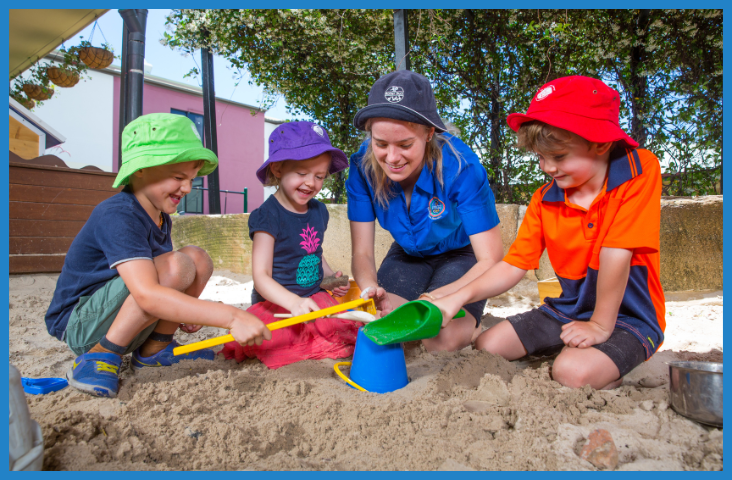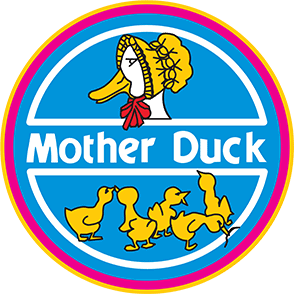
Transitions Are A Big Deal For Our Little People
As adults, change is part of our everyday life, however, if our transition through change is planned and well-organised then we adjust much faster to embrace the ‘new’. Did you know that while adults can often find transitions challenging, not many adults experience the range of transitions children deal with on a daily basis? In early childhood, transitions signify times of change during which children move between and adapt to different spaces or places and with different people, experiences, expectations, and routines.
At Mother Duck, your child experiences many transitions throughout their day – not just from home to the service. These include transitions for the child from one part of the day to another; from big groups to small groups; care routines (such as meals, sleep and rest times); supported self-care routines (such as handwashing and toileting); and end-of-day to home transitions. Transitions also bring challenges and opportunities for social and emotional learning.

The importance of successful transitions…
A successful transition is important for all children and has long-lasting benefits. Children who experience positive transitions into and out of environments are likely to feel better connected, enjoy a sense of belonging, and have their well-being needs met, which allows them to learn and thrive. How well children succeed in a new setting partly depends on thoughtful, respectful, and well-planned transition practices.
Children’s sense of belonging in any setting is strengthened by transition practices that respond to children’s individual interests, abilities, and strengths. Where a child’s first attachments are founded on strong relationships with responsive primary caregivers and other trusting relationships, that child’s wellbeing needs are better supported and a strong base for exploration and learning is secured. At Mother Duck, our educators view building a partnership with families as the key to making strong connections with your child and building a common understanding of expectations, which can help children adjust. When our educators take the time to work collaboratively with families to create meaningful and nurturing relationships, children are provided with opportunities that foster their autonomy, agency, sense of self, and participation in groups
How our Mother Duck Educators support your child’s transitions
Building positive relationships with families before each child starts is key to a successful transition into the service. Everyone at Mother Duck makes it a priority to welcome and communicate with each family member and support the transition process by offering ‘Stay and Play’ visits to studios so that children become familiar with the studio, its equipment, and layout before your child attends our service.
Whenever possible, our educators are rostered to ensure consistency and continuity of care. What this means is access to educators who are consistently warm, responsive, attentive, physically and emotionally available to children, and familiar with your child’s care routines and rituals, interests, preferences, and communication styles.

At Mother Duck, our service leadership teams and educators intentionally plan to support all the transitions your child experiences –
- During enrolment and orientation
- Into and out of our services in the morning and afternoon
- Throughout the day
- When transitioning to a new studio
- When preparing to transition onto formal schooling, and
- Particularly when and where your child is struggling to cope or feeling overwhelmed by changes or challenges in their life
How can I help my child better transition into their day at my Mother Duck service?
You are your child’s greatest champion and can positively support the daily transitions your child experiences. How you feel about transitions influences how your child experiences these times.
1) Prepare your child – The transition to a new learning environment usually brings changes to a child or young person’s relationships, physical and social environments, and daily routines. Talk with your child about their day at Mother Duck, the educators, the children they will meet, the experiences they will have, and most importantly the fun they will have. Share information about the routine activities’ your child will engage in. For example, the mealtimes (menus are always on display to discuss the dish for the day), rest opportunities (children will always have access to their own sheets and cuddly items from home), and that at any time your child can access the bathroom facilities for hand washing and toileting.
2) Establish routines – Consistent routines can help your child feel safer, especially when new things are happening. Children require specific information about transitions and change. Create morning routines that support your child’s successful arrival at Mother Duck. For example, pack your child’s bag with your child so they know they have their sheets, hat, and spare clothes, and where possible organise your morning so that your child does not feel rushed. Consider spending time at the service to participate for a short period in the program. Children who see their families connected with the service (for example, through having positive communication relationships with educators), can feel more secure, and safe and will transition better into the day.

3) Talk with your child – Conversations prepare children for transitions and what to expect. For example, give children a warning, tell them what’s happening next in their day and that you will return, and when it is time, say goodbye to your child before you leave. Yes, your child may become upset at this time – but if you leave without your child noticing, this will create distrust and further anxiety for the child in the long term.
4) Share key information with educators – Through regular contact and good communication, educators can gain an understanding of a child’s home routines and daily well-being. Conversations with educators will ensure that key information about your child’s routines, comfort item or toy, favourite songs and book, and current interests and worries are communicated. For example, sharing information about your child’s day at morning drop off will enable educators to know what is going on in your child’s life, how your child is feeling if they have had breakfast, and how they have slept. This information will support educators to better respond to your child’s needs and assist them in their preparation for the rest of the day.

Transitioning can be a very tricky course to navigate at times, but please remember, that we are always here to support you and your child to have the best experience possible at Mother Duck.


